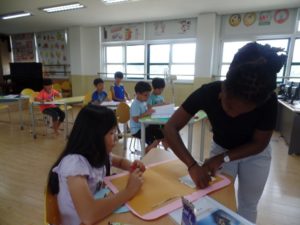Contract Renewal in Korea

Contract renewal in Korea can be a daunting event as you won’t know if they want you for a second year until they ask. This is something I experienced recently as I came to the end of my first year with EPIK.

“Yes, I did” I responded. “Do you want to renew your contract for another year?” My heart beats a little faster. “Yes, I do” My response lacked confidence. It was spoken softly with uncertainty. “Do you want to continue working at this school or do you want to change schools?”
“Why is she asking me this?” I thought to myself. “Does she not like me? Oh, no they don’t want me to stay another year.” I looked at my co-teacher as she impatiently awaited an answer. “This school,” I finally said. “Okay, please circle this, check that, sign on the bottom please.” I did what I was told as she gathered the papers and left the classroom.
Big shoes to fill
I’m an EPIK teacher, living in Daejeon, South Korea. When I first started teaching, I had big shoes to fill. The previous native English teacher was great with the kids and was absolutely loved by all the school staff. The expectations for me were extremely high; because of this my first few months in Korea were very challenging.
In the beginning, there would often be a comparison between the former English teacher and me. He was more outgoing and loud, I was more reserved and quiet. In the classroom, my co-teacher would always say, “Willynn, the kids expect you to be more enthusiastic in class. Tom Teacher always gave high fives and got the students motivated to learn English. You’re too quiet. Try to be more engaging.” What I should’ve done was take my
Taking it personally
What I should’ve done was take my co-teachers advice and work on being better for my students. But instead, I took it personally. In my mind, I thought she was telling me I wasn’t good enough and to be more like Tom Teacher. Consequently, for the past several months I struggled to build a solid rapport with my students.
I also had a hard time building relationships with my colleagues. Don’t get me wrong everyone is very nice, but there’s no real sense of communication. There is a language barrier, but also a cultural difference that’s often hard to navigate. So, when I got the email from the DMOE about contract renewal, I got really nervous about my future in Korea.
The evaluation
I really did not know what to expect until this past Wednesday when my co-teacher sat me down to speak to me about my evaluation. She started with my strengths and eventually she started talking about the areas I need to improve on. For the first time, since living in Korea, I finally understood the perception of my colleagues and students.
I learned my colleagues and students wish I shared more about myself. One of the things she said that really made an imprint on my mind was, in Korean culture, they desire to be close to their community and that comes from sharing their lives outside of school. It’s a sharing culture.
It made me aware of what I have to do to be a part of the community, rather than just the “foreign teacher.” “We can learn from each other,” my cooperative teacher said. “You being here in Korea is a learning opportunity for the school staff as much as it is for the students.” I respect you as a teacher and as an individual. Let’s work together to improve on the social aspect of the job as well as the teaching component.”
Eureka!
It was in that moment I realized I am accepted at my school and they do want me to stay for another year. As a foreigner living in a completely different culture, it’s easier to pinpoint the differences and take offense to constructive criticism that’s meant to help, because of the language barriers; sometimes, the word choice or delivery makes feedback sound more like disapproval.
If at the beginning of the school year I actively listened to what my co-teacher was trying to tell me, instead of taking it personally, my evaluation process wouldn’t have been so daunting. Now, I know what I need to do to improve and can walk in confidence for the upcoming school year.
Have you been teaching in Korea? Did you stay on for a second year, or maybe a third? We would like to hear from you, our readers, about your experiences with the evaluation.




